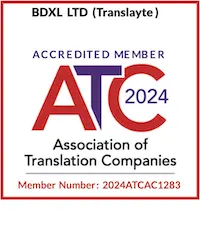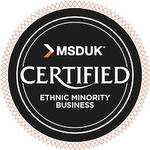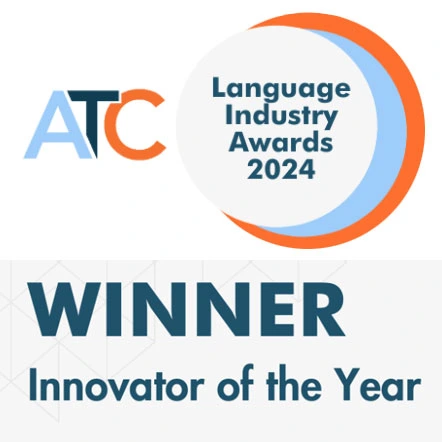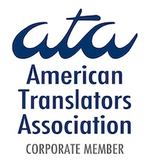Sworn Translations in Germany
If you are submitting non-German documents as part of an application for a residency, passport, or official application in Germany, then you'd need a Sworn German translation.
A sworn or certified German translation is produced by a court-authorised translator, also known as a State Certified Translator. Their sworn statement, signature, and official stamp confirm that the translation is a true and accurate copy of the original document.
Sworn translations are typically needed for civil status documents such as birth, marriage, and death certificates; academic records including diplomas, transcripts, and qualifications; legal documents like court orders, contracts, and adoption papers; immigration documents for residency and passport applications; and medical, technical, or business documents requiring subject expertise.
Official or Sworn Translation Requirements for Germany
In Germany, translations of non-German documents that are meant to be submitted to any authority as part of an official application must often be performed by a sworn translator (beeidigte Übersetzer‘). Sworn German translators, also known as "State Certified" translators, are authorised by a regional German court (Landgerichte), allowing them to provide official translations from select languages into German.
The sworn translator confirms the accuracy and completeness of the translation by including a sworn statement, signature and a stamp on the translation. The stamp must include the translator’s name, language(s) involved and address.
Sworn German translations produced by Translayte are assigned to sworn translators based in Germany and authorised locally. They are responsible for producing the translation, certifying it, and posting the document to you within Germany, or internationally.
Here are some of the requirements for a translation in Germany:
Certified Translations: For many official documents (like birth certificates, marriage certificates, diplomas, etc.), you might need a certified translation from a translator who is sworn or authorized by the German court. These professionals are known to provide an accurate and true translation of original documents. Their seal guarantees that the translation corresponds exactly to the original.
Document Type: Legal documents, medical documents, or technical documents often require a translator with specific expertise in the field.
Language Pair: The translator needs to be proficient in both the source language (the language from which the text is being translated) and the target language (the language into which the text is being translated). For German translation, this means proficiency in both German and the other language involved.
In-Country Requirement: In certain cases, translations need to be done by a translator who is resident in Germany.
Data Protection: Especially for sensitive documents, translators need to follow the General Data Protection Regulation (GDPR) and other relevant laws in Germany.
It's essential to confirm the specific requirements with the relevant German authorities or institutions to which you're submitting the translations. If you use Translayte's services, we will be able to provide guidance on this.
Documents That Require Sworn Translation in Germany
Our sworn German translation services cover a wide range of documents required for official purposes. These include
Civil Status Documents
Academic and Professional Documents
Professional qualifications and licences
Training certificates
References and employment records
Legal and Court Documents
Court orders and judgments
Contracts and agreements
Adoption papers
Power of attorney
Personal Identification and Travel Documents
Financial and Business Documents
Articles of incorporation
Where Sworn Translations Are Required in Germany
Here are a few examples of institutes and offices that require certified/sworn translations from you in Germany:
Registry Offices (Standesamt): For registering births, marriages, or deaths, you'll often need sworn translations of foreign certificates.
Foreigner's Office (Ausländerbehörde): If you're applying for a visa, residence permit, or German citizenship, you may need sworn translations of documents like birth certificates, marriage certificates, or proof of income.
Courts (Gerichte): For legal proceedings, courts often require sworn translations of evidence documents, contracts, and other relevant materials.
Universities and Colleges (Universitäten und Hochschulen): If you're applying to study in Germany and your previous education was in a different language, you'll probably need sworn translations of your transcripts and degrees.
Professional Associations (Berufsverbände): If you're applying for recognition of foreign professional qualifications, you'll likely need sworn translations of your qualifications.
Employers: Some employers may require sworn translations of your qualifications or references if these were originally issued in a different language.
Insurance Companies (Versicherungen): For claims related to incidents that occurred abroad, you might need sworn translations of relevant documents.
Financial Institutions: When applying for a loan, mortgage, or financial assistance, financial institutions may require certified translations of relevant financial documents, such as bank statements, tax returns, and financial reports.
Medical and Healthcare: If you are seeking medical treatment in Germany and your medical records or prescriptions are in a language other than German, certified translations may be required by healthcare providers or hospitals.
Intellectual Property: When registering trademarks, patents, copyrights, or dealing with intellectual property-related legal matters, sworn translations of relevant documents may be necessary.
Adoption Proceedings: In cases involving international adoption, certified translations of adoption-related documents, such as adoption orders, home studies, and legal agreements, may be required.
Public Tenders and Bids: If you are participating in public tenders or bids in Germany, translations of bid documents, proposals, or contracts may need to be certified for submission.
Before proceeding with a translator, it is essential to verify their qualifications, experience, and credentials to ensure they can provide accurate and reliable translations. Here are some key documents and information you should check for; a resume/CV, certification/membership, sample translation, reference/testimonial, confidentiality agreement, turnaround time & availability, rates and terms of payment.
What Details Must a Sworn Translator Include in a German Translation?
In a certified translation from another language to German, the translator typically includes specific details to ensure the authenticity and accuracy of the translation. The exact requirements may vary depending on the institution requesting the translation. However, here are some common details that are often included:
Translator's Statement: The translation should contain a statement from the translator attesting to their qualifications and confirming that the translation is accurate and complete to the best of their knowledge and abilities. This statement is usually positioned at the beginning or the end of the translated document.
Translator's Contact Information: The translator should provide their full name, address, phone number, and email address so that they can be contacted if necessary.
Certification Statement: The translation should include a statement indicating that it is a certified translation. This statement confirms that the translator is authorized or recognized as a certified translator, either by a professional association or a relevant authority.
Official Seal or Stamp: Many certified translations require an official seal or stamp from the translator. This seal may include the translator's name, certification number (if applicable), and other identifying information. The purpose of the seal is to authenticate the translation.
Date of Translation: The date on which the translation was completed should be mentioned to indicate the currency of the translation.
Signature: The translator typically signs the certified translation, indicating their acceptance of responsibility for the accuracy and completeness of the translated document.
Can I Get a Sworn Translation for Germany If I’m Abroad?
Yes, you can obtain a German translation for use in Germany even if you are located outside of the country. Many sworn or certified translators offer their services remotely, and there are also many translation agencies that work with such translators, of which Translayte is one. You can typically send them a scanned copy of your document, and they'll send you back a certified translation.
When ordering from abroad, keep these points in mind:
Translator recognition: The translator must be officially sworn in Germany and registered with a regional court (Landgericht). Translations by “certified translators” from other countries may not be accepted by German authorities.
Delivery format: Many German institutions require the original signed and stamped paper translation, so allow time for postal delivery from Germany.
Data protection: Ensure secure transfer of sensitive documents in compliance with GDPR.
Additional certification: Some documents may require notarisation or an Apostille for use in Germany or abroad, especially under the 1961 Hague Convention. Always check the specific requirements of the German institution for which you're submitting the documents.
With lots of court-registered sworn translators in Germany, Translayte can provide valid sworn translations quickly, securely, and at a fair price.
Can UK-based German-English and English-German translators certify translations?
Yes, UK-based translators can certify translations between German and English, and vice versa. However, whether these translations are accepted by German authorities or institutions depends on the specific requirements of the institution in question.
In the UK, there isn't a system of "sworn translators" like in Germany or some other countries. Instead, translators typically certify a translation by providing a signed statement (a Certificate of Accuracy) affirming that they are competent in the relevant languages and that the translation is a 'true and accurate' representation of the original document. They may also include their contact information and credentials, such as membership in professional organizations like the Chartered Institute of Linguists (CIOL) or the Institute of Translation and Interpreting (ITI).
However, not all German institutions may accept these UK-certified translations. Some may require a translation by a translator who is sworn in Germany. Others might accept a UK-certified translation but require an apostille—a form of international certification under the terms of the 1961 Hague Convention—to confirm the authenticity of the document.
If you're submitting a translation to a German authority or institution, it's crucial to check their specific requirements first. You might also consider working with a translation agency like Translayte that has experience with these procedures and can guide you through them.
The Authentication: Apostille & Legalisation
For documents to be used at foreign embassies in Germany or in another country, you may be required to obtain an Apostille. This makes the translation acceptable in other countries that are part of The Hague Convention.
In Germany, translations cannot be legalised, even if they have been completed by a sworn or certified translator, as they are not considered "public documents". However, the president of an applicable court can issue a certificate verifying the translator's "sworn" or "certified" status. This certificate, which is considered a public document, can then be legalised, with an Apostille affixed to the certificate.
Sworn German translations that are legalised by Translayte are first certified by the sworn translator, with a certificate obtained from a local German court, then legalised at the Apostille Office in Germany. The original document can be shipped to you within Germany, or internationally.
Why Choose Translayte For Your Sworn German Translations?
With years of experience and thousands of satisfied clients worldwide, Translayte is trusted by individuals, businesses, and legal professionals for court-compliant sworn German translations. We combine professional expert translations with a 100% acceptance guarantee to ensure your documents meet the strict standards of German authorities.
Expertise: Our team consists of highly skilled and experienced German-approved sworn translators, editors, and proofreaders specialising in various industries and languages. We guarantee precise translations that capture the nuances and subtleties of your original content.
Quality Assurance: We follow a rigorous, multi-step quality assurance process, including multiple rounds of proofreading and editing to ensure your translations are accurate, clear, and culturally appropriate.
Fast Turnaround: We understand the importance of meeting deadlines and are committed to delivering your translations on time, without compromising quality. We offer flexible turnaround times to suit your project needs and can accommodate urgent requests.
Confidentiality: We take data privacy and security seriously. Strict non-disclosure agreements bind all our team members, and we implement the latest encryption technologies to protect your files and information.
Personalised Service: We value our clients and are dedicated to providing personalized attention to each project. Our responsive customer support team is available 24/7 to address your concerns and answer any questions.
Nationwide Coverage: We offer certified translations across all cities in Germany, including Berlin, Munich, Hanover, Bremen, Hamburg, and Stuttgart, ensuring reliable service wherever you're located.
How We Work
Our streamlined process at Translayte is designed to deliver the highest quality translations in the most efficient manner possible. Here's a step-by-step overview of how we work:
Project Evaluation: Once you submit your project, our team will review your content, discuss your specific requirements, and provide a detailed quote, along with an estimated turnaround time.
Translator Assignment: We carefully select a professional Sworn German translator who has the relevant expertise in your industry and is fluent in the source and target languages. This ensures that your translations are not only accurate but also resonate with your target audience.
Translation Process: Our translator will meticulously translate your content while preserving the original message, tone, and style. They will also ensure that the translation is culturally sensitive and appropriate for your target audience.
Quality Assurance: After the translation is completed, a second linguist will proofread and edit the content to ensure it is free from errors and inconsistencies. This rigorous quality control process guarantees the highest standard of accuracy and readability.
Final Delivery: Once the translation has passed our quality assurance checks, we will deliver the final, polished version to you in your preferred format. Our customer support team will remain available to address any questions or concerns you may have.
We take pride in our work and are committed to exceeding your expectations. Trust Translayte for all your linguistic needs and experience the difference that exceptional translation services can make for your business.
How to Order an Official German Translation Online
Navigate to "CHECK PRICES & PLACE ORDER" on the top right side of this page.
Select "Certified Translation".
Select the source and target languages, respectively.
Upload the official document you need to be translated.
If you want expedited services, select that option. Provide any extra instructions after this.
Select the type of certification you require (Also indicate if you need notarisation or apostille services.)
Click "PROCEED TO ORDER"
Make the payment securely online. Once your order is placed, our team will assign it to a professional translator, and you'll receive the translated document via email or post within the specified timeframe.






















































